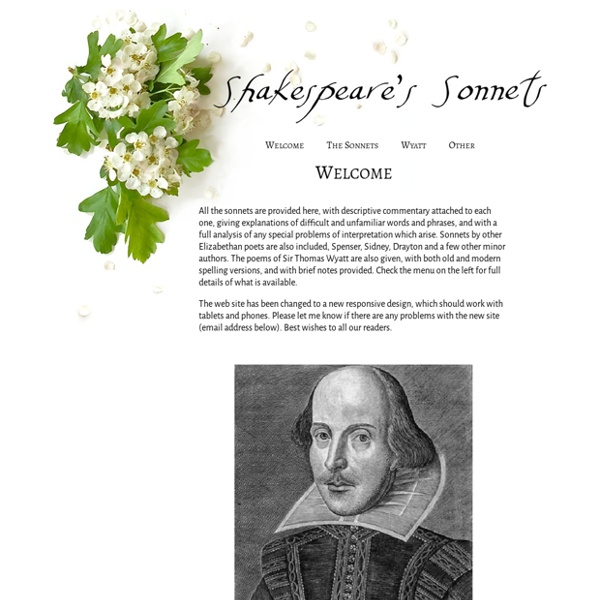



http://www.shakespeares-sonnets.com/
Poetry - An American Prayer, The Doors AWAKE GHOST SONG AWAKE DAWN'S HIGHWAY NEWBORN AWAKENING TO COME OF AGE BLACK POLISHED CHROME (Latino Chrome.) ANGELS AND SAILORS STONED IMMACULATE THE MOVIE CURSES, INVOCATION AMERICAN NIGHT THE WORLD ON FIRE LAMENT THE HITCHHIKER ‑ AN AMERICAN PRAYER,/ HOUR FOR MAGIC/ FREEDOM EXISTS/ A FEAST OF FRIENDS AWAKE GHOST SONG Is everybody in? How the 30-day method works The outline you'll complete using the 30-day method will become a snapshot of your novel. After finishing a full outline, you should feel you've got the makings of an entire book (your story should feel complete, solid, exciting and satisfying) and you should be desperate to start writing the book itself. This first draft outline is the equivalent to the first draft of a manuscript. Because you've revised it so thoroughly, it will read with all the completeness and excitement of a finished novel.
25 Banned Books That You Should Read Today Almost since the dawn of publishing, books have been banned for one reason or another. Many notable banned books are also compelling reads from classic or contemporary literature. This list summarizes 25 of the most controversial banned books from throughout history. #1 To Kill a Mockingbird by Harper Lee Great Poems « Greatest Books of All Time » Life-Changing Arts A selection of great poems from centuries of brillant authors and poets. Whether you are new to the world of poetry and wish to savor it, or a well-versed poetry connoisseur, either way you will probably enjoy the classics of world poetry. The poems are sorted by vote. To vote for a poem, click on the left of it.
UTSA's College of Liberal and Fine Arts Magazine By Cindy Tumiel Four hundred years have passed since William Shakespeare penned his last play. Yet his prose, plots and characters are as alive today as they were when the plays were originally staged during the late sixteenth and early seventeenth centuries. Shakespearean works are required reading for high school English students and a course or two for college students who study writing or literature. The plays have been performed in almost every language, on stage and screen and at popular festivals around the world. Even in prisons, teachers find that Shakespeare offers contemporary connections that open pathways to learning for some of society’s most marginalized.
every poet for everyman, every resource for every poet Try our award-winning Genuine Haiku Generator, our entirely unpolitical Bushku Generator, and Human Bushku and the somewhat mothballed Random Stump Speech Synopsis Haiku Generator Woodberry Poetry Room The Listening Booth represents a small portion of the Woodberry Poetry Room’s total collection: The online highlights feature selections from our on-going digitization of fragile phonodiscs and magnetic media, as well as born-digital recordings from our recent Poetry Room events. Unless otherwise indicated, all recordings were made by or at Harvard University. Additional information about each recording is available via HOLLIS by searching under the author and the year. For playback on the Woodberry Poetry Room website only. The 16 Best Dystopian Books Of All Time Dystopian novels—stories of the horrific future—are so common as to be almost forgettable. Here is a compilation of what I believe are the 16 greatest of the genre. I could happily list twice as many that are amazing, but these are the best. From the post-apocalyptic wasteland to deadly viruses to social malaise, all possible bad futures end here. 16.
How I Pulled Off a $300 Million Drug Deal Brian O'Dea (right) with friends From 1972 until the late 80s, Brian O’Dea was one of the world’s most successful drug smugglers. Then he got addicted to coke, and although he cleaned up following an overdose and a heart attack, the DEA tracked him down. So, throughout the 1990s, while everyone else was enjoying grunge (and coke), Brian was in prison. Nowadays, he’s a big, reformed hit on Canadian TV as a host and producer, and he continues to work with addicts while advocating the legalization of drugs. Liza Paizis ~ Inspirational Fantasy Art, Design & Illustration a Persian Poem ” Don’t seek to recall yesterday that is past Nor repine for tomorrow which has not yet come ; Don’t build your hopes on the past or the future , Be happy now and don’t live on wind…” The Ruba’iyat of Omar Khayyam Like this: Like Loading...
How to get started in Copywriting Writing is a form of art that has mesmerized humanity for centuries. It allows people to express their inner emotions and release their imaginations upon the blankness of a page. Those that enjoy writing even find it therapeutic. However becoming an established author is a life choice that comes with a very low success rate, and so, if you have a passion for creative writing you may want to start out with something a little bit more stable. The answer?